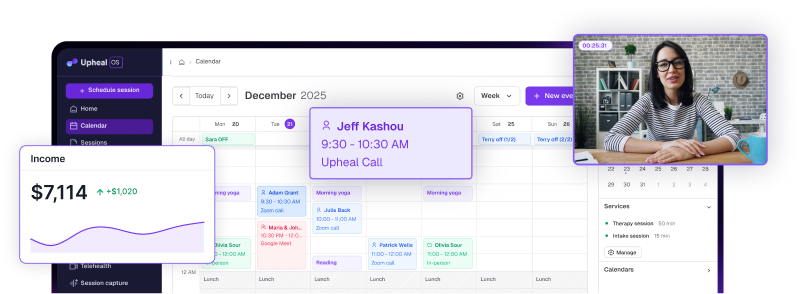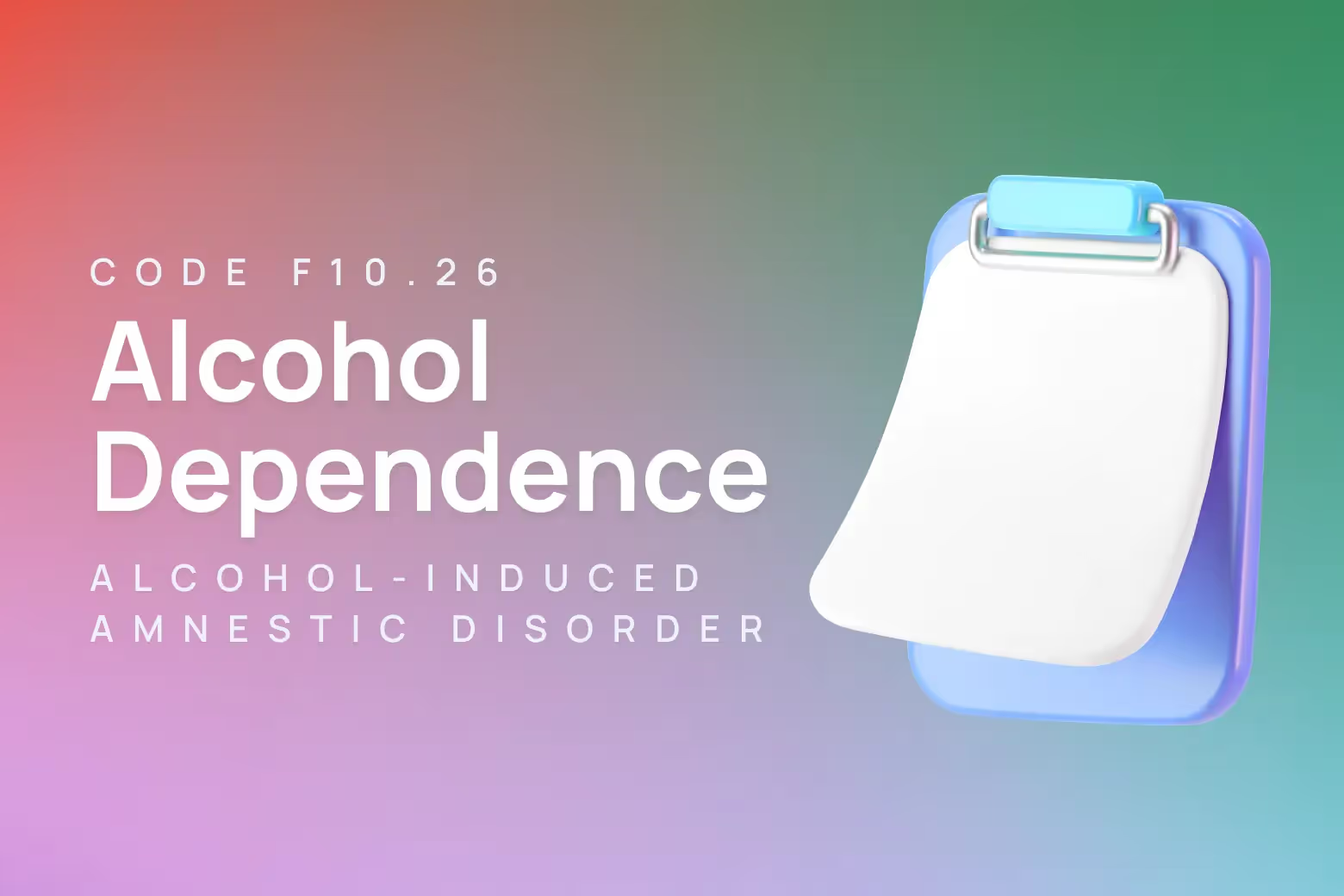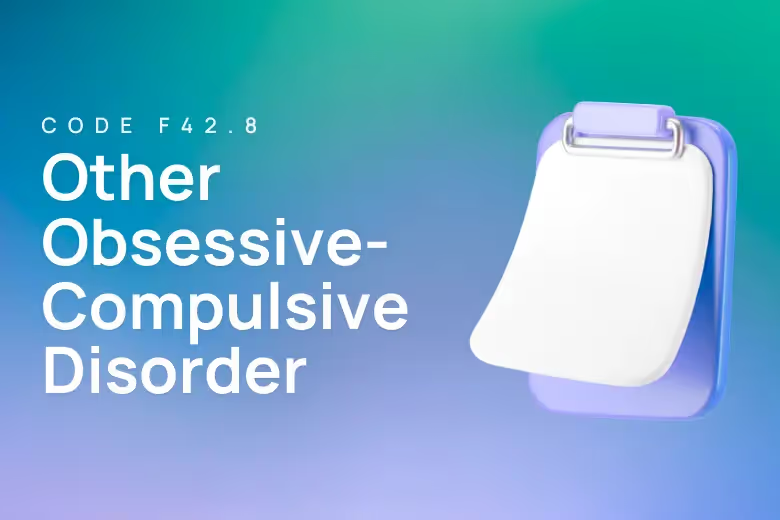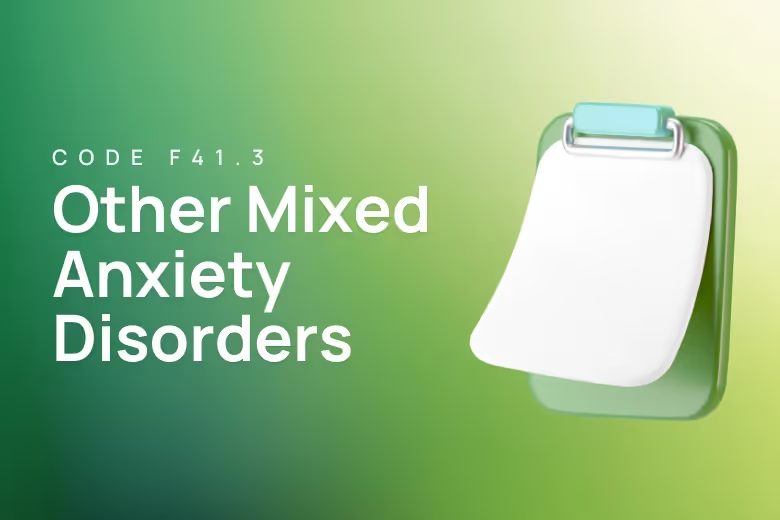ICD-10 code for bipolar disorder, current episode depressed, mild
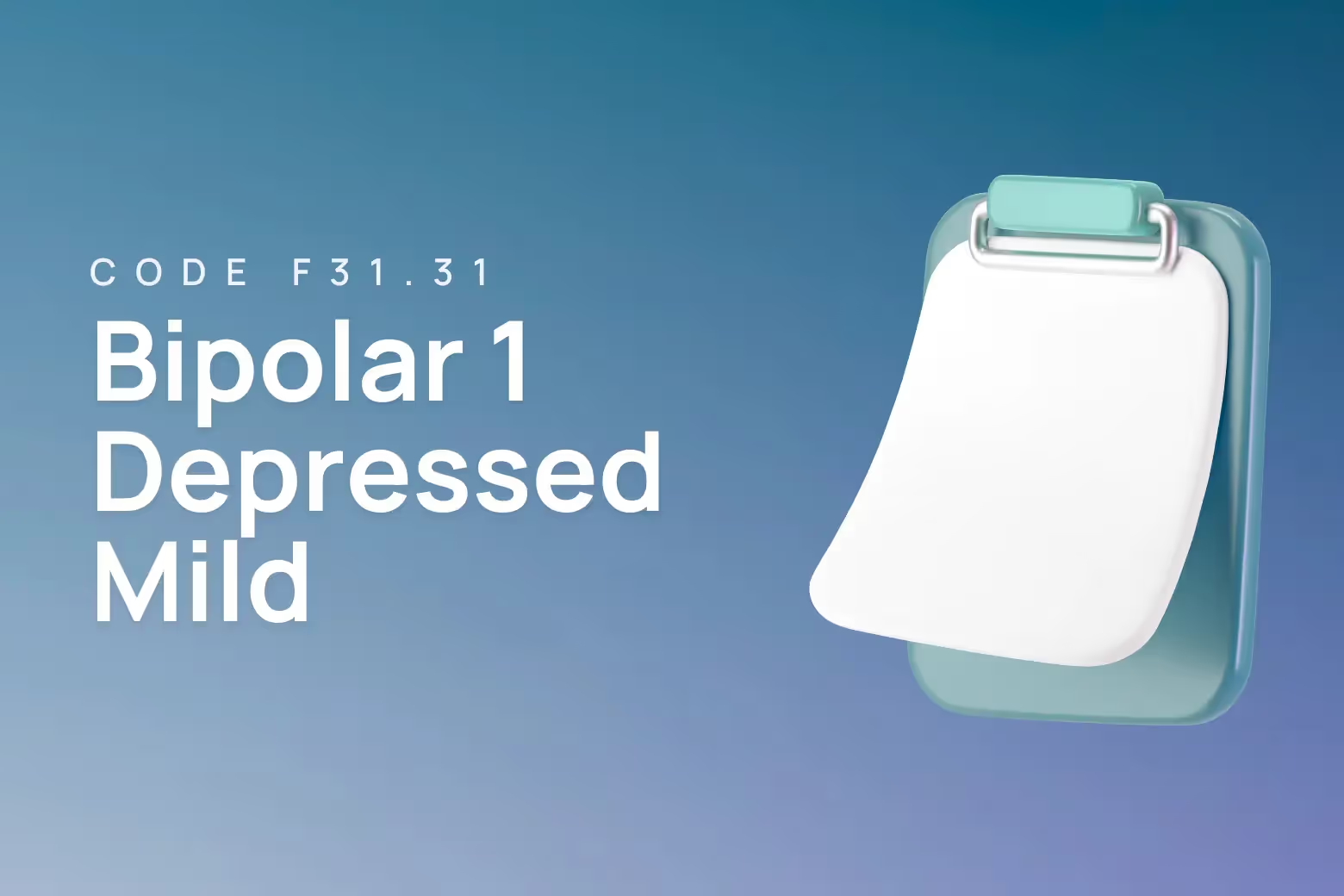
The ICD-10 code for bipolar disorder, current episode depressed, mild is F31.31. This code represents individuals with established bipolar disorder who are currently experiencing a major depressive episode with mild severity.
Accurate diagnosis and documentation ensures clients receive the right level of care while meeting insurance requirements that support continued treatment. Getting the coding right from the start helps build a foundation for long-term therapeutic success.
Key takeaways
- F31.31 applies to bipolar disorder with current mild depressive episode symptoms
- Mild severity means few symptoms beyond diagnostic criteria with manageable distress
- Requires previous manic episode for bipolar I disorder diagnosis
- Distinguishes from moderate (F31.32) and severe depressive episodes (F31.4)
- Treatment includes individual psychotherapy, family therapy, and medication management

Diagnostic criteria for mild depressed episodes of bipolar disorder
To assign F31.31, clinicians must first establish a bipolar I disorder diagnosis, which requires at least one lifetime manic episode lasting seven days or requiring hospitalization. The current major depressive episode must meet criteria for five or more symptoms present nearly daily for at least two weeks, including depressed mood or loss of interest or pleasure.
The mild specifier indicates that few symptoms beyond those required for diagnosis are present. The intensity of symptoms remains distressing but manageable, and they result in minor impairment in social or occupational functioning. This contrasts with more severe presentations where symptoms substantially exceed diagnostic requirements.
Key diagnostic symptoms include:
- Depressed mood most of the day, nearly every day
- Marked decrease in interest or pleasure in activities
- Significant weight loss or gain, or changes in appetite
- Sleep disturbances (insomnia or hypersomnia)
- Psychomotor agitation or retardation observable by others
- Fatigue or loss of energy nearly every day
- Feelings of worthlessness or excessive guilt
- Decreased concentration or indecisiveness
- Recurrent thoughts of death or suicidal ideation
When to use F31.31 diagnosis code
Differential diagnosis plays a crucial role in selecting the appropriate ICD-10 code for bipolar disorder presentations. Clinicians must carefully evaluate symptom severity and functional impairment to distinguish between mild, moderate, and severe episodes.
F31.31 vs F31.32 (Moderate depressed episode)
F31.31 represents mild depressive episodes where symptoms remain manageable and cause minor functional impairment. Clients can typically maintain most responsibilities, though with increased effort and some noticeable changes in performance.
F31.32 applies when symptom count, intensity, and functional impairment fall between mild and severe categories. Moderate episodes create more substantial disruption to daily functioning while remaining below the threshold for severe impairment.
The distinction depends on both symptom burden and the degree to which depression interferes with work, relationships, and self-care activities.
F31.31 vs F31.4 (Severe non-psychotic depressed episode)
F31.4 indicates severe depressive episodes where symptoms substantially exceed diagnostic requirements and markedly interfere with social and occupational functioning. These episodes involve seriously distressing and unmanageable symptoms that often require intensive intervention.
F31.31 represents the milder end of the spectrum, where individuals maintain better functioning despite experiencing genuine depressive symptoms. The key differentiator lies in the severity of impairment and the individual's ability to manage daily responsibilities.
Related ICD-10 codes
- F31.3 - Bipolar disorder, current episode depressed, mild or moderate severity, unspecified
- F31.32 - Bipolar disorder, current episode depressed, moderate
- F31.4 - Bipolar disorder, current episode depressed, severe, without psychotic features
- F31.5 - Bipolar disorder, current episode depressed, severe, with psychotic features
Interventions and CPT codes for bipolar disorder, current episode depressed, mild
Individual psychotherapy
Evidence-based psychotherapeutic interventions form the foundation of treatment for mild bipolar depression. Cognitive behavioral therapy helps clients identify and modify negative thought patterns while developing coping strategies for mood management.
Interpersonal and social rhythm therapy addresses the relationship between daily routines, sleep patterns, and mood stability. This approach proves particularly valuable for individuals with bipolar disorder who benefit from structured schedules and consistent daily rhythms.
Individual psychotherapy sessions use these CPT codes:
- 90832 - 30-minute session
- 90834 - 45-minute session
- 90837 - 60-minute session
Family therapy
Family involvement can significantly improve treatment outcomes by addressing relationship dynamics and building supportive home environments. Family members learn to recognize early warning signs of mood episodes while developing healthy communication patterns.
Family therapy helps address the impact of bipolar disorder on relationships and teaches family members how to provide appropriate support without enabling unhealthy behaviors.
CPT codes for family therapy depend on client participation:
- 90846 - Family therapy without client present
- 90847 - Family therapy with client present
Medication management
Mood stabilizers often remain necessary even during mild depressive episodes to prevent episode escalation and maintain overall stability. Common medication include lithium, anticonvulsants, and atypical antipsychotics, depending on individual response patterns and side effect profiles.
Medication management visits typically use:
- 99213 - Office visit, low complexity
- 99214 - Office visit, moderate complexity
How Upheal supports F31.31 ICD-10 documentation
Suggesting appropriate ICD-10 codes based on session content
Upheal's clinical documentation platform analyzes session notes and client presentations to suggest the most accurate diagnostic codes. The system recognizes patterns consistent with mild bipolar depression, helping clinicians distinguish between F31.31 and related codes like F31.32 or F31.4.
Maintaining HIPAA-compliant records with proper diagnostic coding
Upheal maintains all clinical documentation within secure, HIPAA-compliant systems while tracking diagnostic code usage for quality assurance purposes.
The platform helps clinicians document the specific criteria that support F31.31 diagnosis, creating clear justification for mild severity designation. This thorough documentation protects against coverage denials and supports treatment continuity.
Reducing administrative burden so you can focus on client care
Clinical documentation requirements can pull attention away from direct client interaction during sessions. Upheal handles the technical aspects of note generation and code selection, allowing clinicians to maintain therapeutic presence with their clients.
Supporting clients with bipolar disorder, current episode depressed, mild
The journey through mild bipolar depression requires careful attention to prevent symptom escalation while building resilience for long-term stability. Clients benefit from consistent therapeutic support that addresses both immediate symptom management and broader life skills development.
Early intervention during mild episodes can prevent progression to more severe depression that disrupts functioning and requires intensive treatment. The therapeutic relationship provides crucial support during these vulnerable periods when clients may feel discouraged despite maintaining basic functioning.
Upheal's clinical documentation platform helps providers maintain thorough records while dedicating full attention to client care. With automated note generation and intelligent diagnostic coding, clinicians can focus on what matters most - supporting clients through their recovery journey while building skills for lasting wellness.
Ready to simplify your documentation process? Try Upheal free and discover how intelligent clinical support can improve both your practice efficiency and client outcomes.
